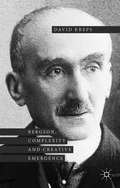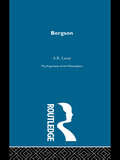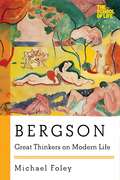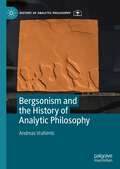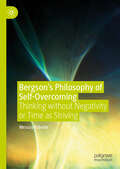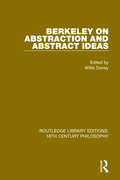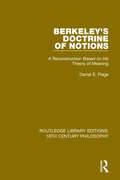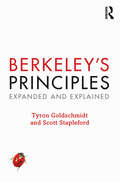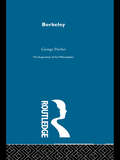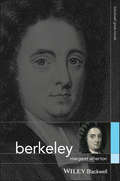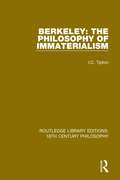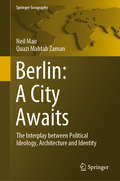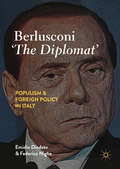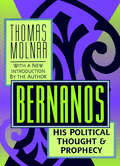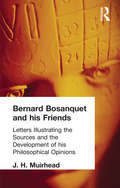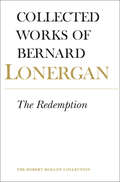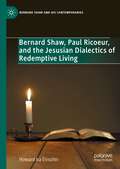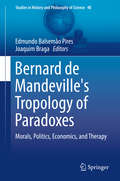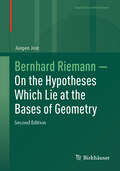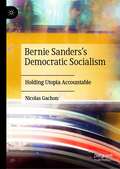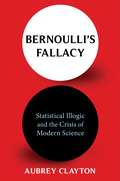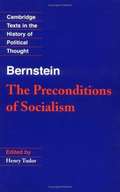- Table View
- List View
Bergson, Complexity and Creative Emergence
by David KrepsThis is a book about evolution from a post-Darwinian perspective. It recounts the core ideas of French philosopher Henri Bergson and his rediscovery and legacy in the poststructuralist critical philosophies of the 1960s, and explores the confluences of these ideas with those of complexity theory in environmental biology.
Bergson-Arg Philosophers (Arguments Of The Philosophers Ser.)
by A.R. LaceyFirst Published in 1999. Routledge is an imprint of Taylor & Francis, an informa company.
Bergson: Great Thinkers on Modern Life (Great Thinkers on Modern Life) (Great Thinkers On Modern Life Ser. #0)
by Michael FoleyIn this new and accessible look at the philosophy of Henri Bergson, learn how the ideas of the great French thinker can enhance your day to day life Henri Bergson was a French professor and philosopher. Born in Paris in 1859 to a Polish composer and Yorkshire woman of Irish descent, his revelatory ideas of life as ceaseless becoming and the importance of attention, learning, humor and joy brought him incredible fame and media celebrity. Here you will find insights from his greatest works. The Life Lessons series from The School of Life takes a great thinker and highlights those ideas most relevant to ordinary everyday dilemmas. These books emphasize ways in which wise voices from the past have urgently important and inspiring things to tell us.
Bergsonism and the History of Analytic Philosophy (History of Analytic Philosophy)
by Andreas VrahimisDuring the first quarter of the twentieth century, the French philosopher Henri Bergson became an international celebrity, profoundly influencing contemporary intellectual and artistic currents. While Bergsonism was fashionable, L. Susan Stebbing, Bertrand Russell, Moritz Schlick, and Rudolf Carnap launched different critical attacks against some of Bergson’s views. This book examines this series of critical responses to Bergsonism early in the history of analytic philosophy. Analytic criticisms of Bergsonism were influenced by William James, who saw Bergson as an ‘anti-intellectualist’ ally of American Pragmatism, and Max Scheler, who saw him as a prophet of Lebensphilosophie. Some of the main analytic objections to Bergson are answered in the work of Karin Costelloe-Stephen. Analytic anti-Bergsonism accompanied the earlier refutations of idealism by Russell and Moore, and later influenced the Vienna Circle’s critique of metaphysics. It eventually contributed to the formation of the view that ‘analytic’ philosophy is divided from its ‘continental’ counterpart.
Bergson’s Philosophy of Self-Overcoming: Thinking without Negativity or Time as Striving
by Messay KebedeThis book proposes a new reading of Bergsonism based on the admission that time, conceived as duration, stretches instead of passes. This swelling time is full and so excludes the negative. Yet, swelling requires some resistance, but such that it is more of a stimulant than a contrariety. The notion of élan vital fulfills this requirement: it states the immanence of life to matter, thereby deriving the swelling from an internal effort and allowing its conceptualization as self-overcoming. With self-overcoming as the inner dynamics of reality, Bergson dismisses all forms of dualism and reductionist monism because both the absence of negativity and the swelling nature of time posit a creative process yielding a qualitatively diverse world. This graded oneness is how the lower level activates intensification by turning into limitation, making possible higher levels of achievement, in particular through the union of mind and body and the integration of openness and closed sociability.
Berkeley on Abstraction and Abstract Ideas (Routledge Library Editions: 18th Century Philosophy #1)
by Willis DoneyBerkeley’s critique of abstract ideas in the Introduction to Principles of Human Knowledge has provoked a great deal of commentary of various sorts. This anthology, first published in 1989, presents a selection of historically important and philosophically interesting discussions on Berkeley’s theories.
Berkeley's A Treatise Concerning the Principles of Human Knowledge
by P. J. E. KailGeorge Berkeley's Principles of Human Knowledge is a crucial text in the history of empiricism and in the history of philosophy more generally. Its central and seemingly astonishing claim is that the physical world cannot exist independently of the perceiving mind. The meaning of this claim, the powerful arguments in its favour, and the system in which it is embedded, are explained in a highly lucid and readable fashion and placed in their historical context. Berkeley's philosophy is, in part, a response to the deep tensions and problems in the new philosophy of the early modern period and the reader is offered an account of this intellectual milieu. The book then follows the order and substance of the Principles whilst drawing on materials from Berkeley's other writings. This volume is the ideal introduction to Berkeley's Principles and will be of great interest to historians of philosophy in general.
Berkeley's Doctrine of Notions: A Reconstruction Based on his Theory of Meaning (Routledge Library Editions: 18th Century Philosophy #3)
by Daniel E. FlageThis book, first published in 1987, offers a reconstruction of Berkeley’s doctrine on notions by examining the implications of his repeated suggestion that there is a close relationship between his doctrine and his semantic theory. The study ties in with some of the most important topics in modern analytic philosophy, and casts important light on modern philosophical concerns as well as on Berkeley’s thought.
Berkeley's Principles: Expanded and Explained (Cambridge Philosophical Texts In Context Ser.)
by George Berkeley Tyron Goldschmidt Scott StaplefordBerkeley's Principles: Expanded and Explained includes the entire classical text of the Treatise Concerning the Principles of Human Knowledge in bold font, a running commentary blended seamlessly into the text in regular font and analytic summaries of each section. The commentary is like a professor on hand to guide the reader through every line of the daunting prose and every move in the intricate argumentation. The unique design helps today's students learn how to read and engage with one of modern philosophy's most important and exciting classics.
Berkeley-Arg Philosophers: The Arguments Of The Philosophers (Arguments Of The Philosophers Ser.)
by George PitcherFirst Published in 1999. Routledge is an imprint of Taylor & Francis, an informa company.
Berkeley: Critical Essays On Locke, Berkeley, And Hume (Blackwell Great Minds)
by Margaret AthertonPresents a concise and comprehensive analysis of George Berkeley’s thought and the impact of his intellectual contributions to philosophy In this latest addition to the Blackwell Great Minds series, noted scholar of early modern philosophy Margaret Atherton examines Berkeley’s most influential work and demonstrates the significant conceptual impact of his ideas in metaphysics and the philosophy of religion. A concise and rigorous primer on Berkeley’s essential writings and contributions to modern philosophy Written by a leading scholar of early modern philosophy Offers insight into the foundations of modern metaphysical and religious philosophy Equips readers to find firm footing in Berkeley’s wider body of published work in the canon of Western philosophy
Berkeley: Philosophical Writings
by Desmond M. Clarke George BerkeleyGeorge Berkeley (1685-1753) was a university teacher, a missionary, and later a Church of Ireland bishop. The over-riding objective of his long philosophical career was to counteract objections to religious belief that resulted from new philosophies associated with the Scientific Revolution. Accordingly, he argued against scepticism and atheism in the Principles and the Three Dialogues; he rejected theories of force in the Essay on Motion; he offered a new theory of meaning for religious language in Alciphron; and he modified his earlier immaterialism in Siris by speculating about the body's influence on the soul. His radical empiricism and scientific instrumentalism, which rejected the claims of the sciences to provide a realistic interpretation of phenomena, are still influential today. This edition provides texts from the full range of Berkeley's contributions to philosophy, together with an introduction by Desmond M. Clarke that sets them in their historical and philosophical contexts.
Berkeley: The Philosophy of Immaterialism (Routledge Library Editions: 18th Century Philosophy #2)
by I.C. TiptonThis book, first published in 1974, presents a critical examination of Berkeley’s immaterialism. It is based on a detailed study of his writings (in particular of his notebooks), and while it places his ideas against their eighteenth-century background it also takes into account the various interpretations of Berkeley found in the literature.
Berlin: The Interplay between Political Ideology, Architecture and Identity (Springer Geography)
by Quazi Mahtab Zaman Neil MairPolitical meaning in architecture has been a subject of interest to many critics and writers. The most notable of these include Charles T. Goodsell and Kenneth Frampton. In Goodsell's (1988) statement “Political places are not randomly or casually brought into existence” (ibid, p. 8), the stipulation is that architecture has been used very deliberately in the past to bolster connotations of power and strength in cities representative of larger nations and political movements. The question central to this book relates to how this can be achieved. Goodsell argues that any study of the interplay between political ideology, architecture, and identity, demands a place imbued with political ideas opposed to “cold concepts and lifeless abstractions” (Goodsell 1988, p. 1). As a means through which to examine and evaluate the ways in which the development of cities can be influenced by political and ideological tendencies, this book focuses on Berlin, as a political discourse, given its significant destruction and reorganisation to reinstate its identity in the context of geopolitics and the advent of globalisation.
Berlusconi ‘The Diplomat’: Populism and Foreign Policy in Italy
by Emidio Diodato Federico NigliaThis book analyses the foreign policy of Silvio Berlusconi, Italian media tycoon and politician who served as Prime Minister of Italy in four governments. The authors examine the Italian position in the international arena and its foreign policy tradition, as well as Berlusconi’s general political stance, Berlusconi’s foreign policy strategies and the impact of those strategies in Italy. Given that Berlusconi is considered a populist leader, the volume considers his foreign policy as an instance of populist foreign policy – an understudied but increasingly relevant topic.
Bernanos: His Political Thought and Prophecy
by Thomas MolnarThomas Molnar's Bernanos is an illuminating study of the personal evolution of the French Catholic novelist Georges Bernanos from a reactionary royalist to a religiously principled anti-fascist. It also provides a detailed account of the intellectual divisions within the French Catholic Right and suggests a number of parallels with intellectual and literary figures on the secular and religious left including Zola, Peguy, and Simone Weil. But, as Molnar points out, the significance of Bernanos is not exhausted by his writings. Bernanos the man is as deserving of attention as is Bernanos the novelist, essayist, and social critic.Molnar shows Bernanos against the troubled political-religious background of modern France: the Dreyfus case, the disillusionment following World War I, the Franco regime, Vichy, and the beginnings of the cold war. Whatever touched France touched Bernanos, and he flung himself into each crisis, not armed with a political system nor an academically sanctioned philosophy, but with a peasant's respect for what is and a Christian's sense of what might be. The portrait that Molnar draws is that of a passionately concerned Christian who knows that truth is hard to come by, but who is ready to follow it wherever it leads, regardless of the consequences.A crucial theme covered by Molnar is Bernanos' long and conflicted relations with Charles Maurras and the Action Francaise. He makes clear the extent to which Bernanos' fervent Catholicism set him apart from Maurras whose positivistic inspiration and passion for order helped lay the groundwork for the political collapse that led to the Vichy regime. Thomas Molnar's book is a fascinating account of Georges Bernanos' stature as both a political thinker and an important novelist. Bernanos will be enjoyed by historians, political scientists, philosophers, theologians, and scholars of literature.
Bernard Bosanquet and his Friends: Letters Illustrating the Sources and the Development of his Philosophical Opinions
by J. H. MuirheadThis is Volume XIX of twenty-two in a collection on 20th Century Philosophy. Originally published in 1935, and makes enquiries into the surviving letters of Bosanquet in order to analyse his philosophical opinions.
Bernard Lonergan: The Redemption, Volume 9 (Collected Works of Bernard Lonergan #9)
by Bernard Lonergan Robert Doran, S.J. H. Daniel Monsour Jeremy WilkinsThematically focused on the theology of redemption or what is called in theology "soteriology," each of the two sections of The Redemption addresses biblical literature and significant moments in the history of Christian theology, and especially the work of Anselm of Canterbury. The second part of the book presents a significant treatment of the problem of good and evil, and introduces the important category of cultural evil. Most significant from the standpoint of Lonergan's original contribution is the treatment accorded in both Part 1 and Part 2 to what he calls "the just and mysterious law of the cross." The treatment of biblical literature contains a valuable distinction between "redemption as end" and "redemption as medium." Beginning with theses 15-17 from Lonergan's Collected Works, The Incarnate Word, this volume also includes rare and never-before-published texts originally written in the late 1950s.
Bernard Shaw, Paul Ricoeur, and the Jesusian Dialectics of Redemptive Living (Bernard Shaw and His Contemporaries)
by Howard Ira EinsohnThis book explores a heretofore unremarked linkage between Bernard Shaw, the twentieth-century French thinker Paul Ricoeur, and Jesus of Nazareth. The ties that bind them are a foundational interest in the social teachings of the Nazarene and their use of a shared dialectics with respect to living the kind of compassionate life that holds out the promise in our contemporary world of achieving something approximating universal wellness on a healthy planet at peace with itself. This work argues that the three principal subjects of the study—independently of one another—used the same dialectical method to reach the same dialectically derived conclusion about how humans can live redemptively in a fractured world.
Bernard Williams (Philosophy Now Ser. #8)
by Mark JenkinsFrom his earliest work on personal identity to his last on the value of truthfulness, the ideas and arguments of Bernard Williams - in the metaphysics of personhood, in the history of philosophy, but especially in ethics and moral psychology - have proved sometimes controversial, often influential, and always worth studying. This book provides a comprehensive account of Williams's many significant contributions to contemporary philosophy. Topics include personal identity, various critiques of moral theory, practical reasoning and moral motivation, truth and objectivity, and the relevance of ancient Greece to modern life. It not only positions Williams among these important philosophical topics, but also with regard to the views of other philosophers, including prominent forerunners such as Hume and Nietzsche and contemporary thinkers such as, Nagel, McDowell, MacIntyre and Taylor. The fragmentary nature of Williams's work is addressed and recurring themes and connections within his work are brought to light.
Bernard de Mandeville's Tropology of Paradoxes: Morals, Politics, Economics, and Therapy (Studies in History and Philosophy of Science #40)
by Edmundo Balsemão Pires Joaquim BragaThis book integrates studies on the thought of Bernard de Mandeville and other philosophers and historians of Modern Thought. The chapters reflect a rethinking of Mandeville's legacy and, together, present a comprehensive approach to Mandeville's work. The book is published on the occasion of the 300 years that have passed since the publication of the Fable of the Bees. Bernard de Mandeville disassembled the dichotomies of traditional moral thinking to show that the outcomes of the social action emerge as new, non-intentional effects from the combination of moral opposites, vice and virtue, in such a form that they lose their moral significance. The work of this great writer, philosopher and physician is interwoven with an awareness of the paradoxical nature of modern society and the challenges that this recognition brings to an adequate perspective on the historical world of modernity.
Bernhard Riemann — On the Hypotheses Which Lie at the Bases of Geometry (Classic Texts in the Sciences)
by Jürgen JostThis book presents William Clifford&’s English translation of Bernhard Riemann&’s seminal text, accompanied by detailed mathematical, historical, and philosophical commentary. It explores Riemann&’s revolutionary ideas on space, placing them within the broader framework developed by later thinkers such as Helmholtz, Ricci, Weyl, and Einstein. A historical introduction situates Riemann&’s work in its 19th-century context, while subsequent chapters trace the evolution of the concept of space across philosophy, physics, and mathematics, and examine its enduring influence up to modern research. The second edition includes expanded mathematical commentary, a new section on metric geometry and machine learning, a systematic bibliography, and numerous updates throughout. Appealing to mathematicians, historians, and readers with an interest in physics or philosophy, this book provides a comprehensive perspective on Riemann&’s groundbreaking contributions and their lasting impact.
Bernie Sanders’s Democratic Socialism: Holding Utopia Accountable
by Nicolas GachonThis book provides a framework for understanding and analyzing Bernie Sanders’s democratic socialism, its origins, its maturation, and its evolution between 1972, when Sanders ran for the Vermont gubernatorial election for the first time, and 2020, when he made his second presidential run. The core argument is that Bernie Sanders’s characteristic brand of socialism evolved from the mould of late 19th century utopian radicalism to radical demands for state and corporate accountability in the 21st century, turning into a social movement for reparative justice that rose to national prominence in the wake of the Great Recession in 2008 and of the Occupy Wall Street movement in 2011.
Bernoulli's Fallacy: Statistical Illogic and the Crisis of Modern Science
by Aubrey ClaytonThere is a logical flaw in the statistical methods used across experimental science. This fault is not a minor academic quibble: it underlies a reproducibility crisis now threatening entire disciplines. In an increasingly statistics-reliant society, this same deeply rooted error shapes decisions in medicine, law, and public policy with profound consequences. The foundation of the problem is a misunderstanding of probability and its role in making inferences from observations.Aubrey Clayton traces the history of how statistics went astray, beginning with the groundbreaking work of the seventeenth-century mathematician Jacob Bernoulli and winding through gambling, astronomy, and genetics. Clayton recounts the feuds among rival schools of statistics, exploring the surprisingly human problems that gave rise to the discipline and the all-too-human shortcomings that derailed it. He highlights how influential nineteenth- and twentieth-century figures developed a statistical methodology they claimed was purely objective in order to silence critics of their political agendas, including eugenics.Clayton provides a clear account of the mathematics and logic of probability, conveying complex concepts accessibly for readers interested in the statistical methods that frame our understanding of the world. He contends that we need to take a Bayesian approach—that is, to incorporate prior knowledge when reasoning with incomplete information—in order to resolve the crisis. Ranging across math, philosophy, and culture, Bernoulli’s Fallacy explains why something has gone wrong with how we use data—and how to fix it.
Bernstein: The Preconditions of Socialism
by Eduard Bernstein Henry TudorThis is the first complete new translation of Eduard Bernstein's (1850-1932) famous and influential work. It will provide students with an accurate and unabridged edition of the classic defense of democratic socialism and the first significant critique of revolutionary Marxism from within the socialist movement. First published in 1899, at the height of the Revisionist Debate, it argued that capitalism was not heading for the major crisis predicted by Marx, and that socialism could be achieved by piecemeal reform within a democratic constitutional framework. Bernstein's work is the focal point of one of the most important political debates of modern times, and crucial for the light it casts on "the crisis of Communism. "
